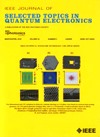Submission Deadline: April 1 (Mon), 2019
Hard Copy Publication: January/February 2020
Call for Papers (Jump to IEEE Photonics Society Web Page)
The IEEE Journal of Selected Topics in Quantum Electronics (JSTQE) invites manuscript submissions in the area of Photonics for Deep Learning and Neural Computing. Artificial Intelligence (AI) is transforming our lives by revolutionizing the healthcare industry with complex medical data analysis, actualizing self-driving cars, and beating humans at strategy games such as Go. It takes thousands of CPUs and GPUs, and many weeks to train the neural networks in AI hardware. Over the last six years, this compute power has doubled every 3.5 months. Traditional CPUs, GPUs, and neuromorphic electronics will not be powerful enough to train the neural networks of the near future. There is an immediate need to develop the next generation of AI hardware. Fundamentally, AI computing concepts heavily depend on interconnects, a functionality where photonic processors significantly outperform electronic systems. By combining the high bandwidth and efficiency of photonic devices with the adaptive, parallelism and complexity similar to the brain, photonic neural networks have the potential to be faster than conventional neural networks while consuming less energy. The purpose of this issue is to present the state-of-the-art in this field through a collection of invited and contributed papers ranging from photonic devices, systems, architectures and algorithms, and applications to photonic deep learning and neuromorphic computing. It is our hope that this special issue will serve as a universal resource for future development. Topics of this call include (but are not limited to):
Neuromorphic hardware, Neuromorphic algorithms, Analog optical computing, Spiking neural networks, Reservoir computing, Recurrent and convolutional neural networks, Reinforcement learning and backpropagation Photonic synaptic devices, Optical neural networks architecture, Deep learning hardware accelerators, Attojoule photonic nonlinear devices, Photonics memory, in memory computing, edge processing, Cryogenic photonic neural networks, Inverse design concepts, Optical Ising machines Complex systems.

